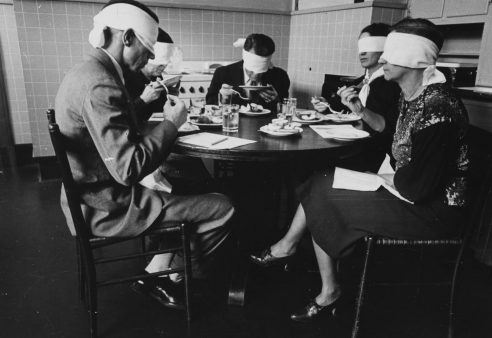What Polarization Does to Us
30 May 2019
Commentators from across the political spectrum warn us that extreme partisan polarization is dissolving all bases for political cooperation, thereby undermining our democracy. The near total consensus on this point is suspicious. A recent Pew study finds that although citizens want politicians to compromise more, they tend to blame only their political opponents for the deadlock. In calling for conciliation, they seek capitulation from the other side. The warnings about polarization might themselves be displays of polarization.
Discussions of polarization tend to fix on what polarization does to our politics — policy stalemates, negative campaigns, partisan hostility, and so on. Were polarization simply a matter of its political manifestations, the solution would be simply that everyone should take a moment to recognize that, despite partisan divides, we’re all ultimately on the same team. The trouble is that polarization runs deeper than this. It affects us on the inside.
To see this, it helps to distinguish political polarization from belief polarization. The former is the name for the condition of political intransigence that is now familiar. The latter refers to a phenomenon by which interactions with likeminded others transform us into more extreme versions of ourselves. The two are related, of course. And seeing the contribution that belief polarization makes to political polarization is crucial for understanding current political dysfunctions.
Belief polarization renders us more extreme, in two sense of the term. First, when we surround ourselves only with likeminded others, we become inordinately confident in our commitments. Thus in the course of belief polarization, one who is inclined to believe that climate change is a hoax will become more convinced that it is. Second, belief polarization also leads us to adopt more extreme beliefs. For example, when juries are agreed that a punitive award is in order, in the course of their discussion each member comes to favor a more severe punishment. In short, when people get together with likeminded others, each intensifies their level of confidence in a belief that is more extreme than the belief with which they started.
Belief polarization is uncommonly robust. It has been extensively studied around the world and found in likeminded groups of almost all kinds, from political parties, business firms, and juries to social clubs, classrooms, and informal gatherings of neighbors. Our vulnerability to it remains constant regardless of education, economic status, gender, race, profession, and political orientation. What’s more, our susceptibility does not vary with the point of our interactions; we belief polarize when chatting about mundane matters of fact (such as the elevation of a particular city), and we belief polarize when deliberating together about what collective action to take in response to a social problem (such as political corruption). Finally, although likeminded discussion is a reliable site for studying belief polarization, research suggests that neither discussion nor face-to-face group interaction is necessary for the effect. It can be initiated simply by presenting subjects with evidence that a belief they hold is popular with others who share their social identity. Consequently, features of the social environment can induce shifts towards extremity.
Belief polarization is philosophically disconcerting. However, it is also politically hazardous. Belief polarization alters what we believe about others. As we transform into more extreme versions of ourselves, we also come to adopt increasingly negative stances towards those we perceive to be different. As we shift towards a more extreme position, opposing views begin to look increasingly unfounded, unreasonable, and irrational. Accordingly, those who hold such views appear to us as ignorant, naïve, and malign. Further, as we shift toward extremity, we come to regard our opponents as the extremists. We lose the ability to recognize nuance in their views; we come to see them a monolith of fanaticism. As might be expected, we grow distrustful of them, increasingly inclined to fault them with being lazy, unpatriotic, unintelligent, and treacherous. In the end, once belief polarization has set in, amiable interactions with our political opponents tend to further our extremity; calls to “reach across the aisle” can backfire. Ironically, as we come to regard our opponents in these ways, we come to more fully fit the description we ascribe to them.
Belief and political polarization hence are intertwined in a downward-spiraling dynamic. As we come to see our political rivals as irrational and untrustworthy extremists, we also grow less likely to regard them as capable of proper democratic citizenship. Politically, they appear to us more as obstacles to be overcome than as political equals. Attempts at civility and cooperation begin to look Pollyannaish, if not positively complicit. The basis for regarding those with whom we disagree as nonetheless our fellow citizens, each entitled to an equal say, recedes. So we hive together in likeminded political enclaves, thus occasioning further belief polarization. As a result, democracy devolves into a cold civil war.
Given that belief polarization can be exacerbated by inter-group interaction, it is difficult to know what remedial steps to take. A lot of the literature addressed to the problem of belief polarization attends to settings in which it can be prevented. These measures are not adequate strategies for depolarization. Common calls for politically diversifying one’s social media feeds are for the same reason inadequate. In a forthcoming book (Overdoing Democracy: Why We Must Put Politics in its Place), I argue that we can depolarize only by devising venues for social cooperation that are not organized around our political identities and allegiances. If we want a healthy democracy, we sometimes need to do things together that are not at all political. The trouble, of course, is that in contemporary democratic societies, the categories and dynamics of party politics have infiltrated whole of our social lives. This is why we struggle to imagine what a nonpolitical cooperative activity would be like. That struggle is another symptom of polarization.
Comments
- October 2025
- September 2025
- August 2025
- July 2025
- June 2025
- May 2025
- April 2025
- March 2025
- February 2025
- January 2025
- December 2024
- November 2024
- October 2024
- September 2024
- August 2024
- July 2024
- June 2024
- May 2024
- April 2024
- March 2024
- February 2024
- January 2024
- December 2023
- November 2023
- October 2023
- September 2023
- August 2023
- July 2023
- June 2023
- May 2023
- April 2023
- March 2023
- February 2023
- January 2023
- December 2022
- November 2022
- October 2022
- September 2022
- August 2022
- July 2022
- June 2022
- May 2022
- April 2022
- March 2022
- February 2022
- January 2022
- December 2021
- November 2021
- October 2021
- September 2021
- August 2021
- July 2021
- June 2021
- May 2021
- April 2021
- March 2021
- February 2021
- January 2021
- December 2020
- November 2020
- October 2020
- September 2020
- August 2020
- July 2020
- June 2020
- May 2020
- April 2020
- March 2020
- February 2020
- January 2020
- December 2019
- November 2019
- October 2019
- September 2019
- August 2019
- July 2019
- June 2019
- May 2019
- April 2019
- March 2019
- February 2019
- January 2019
- December 2018
- November 2018
- October 2018
- September 2018
- August 2018
- July 2018
- June 2018
- May 2018
- April 2018
- March 2018
- February 2018
- January 2018
- December 2017
- November 2017
- October 2017
- September 2017
- August 2017
- July 2017
- June 2017
- May 2017


61 comments
Comments are closed.